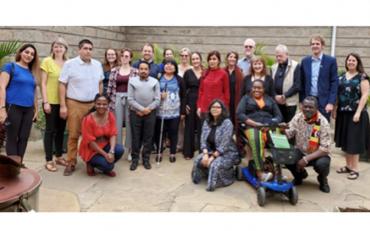The 5th IDA Programme Committee (IPC) meeting took place in Nairobi, Kenya from 29 – 31 January, 2020. Over the course of the 3 productive days, the IPC worked their way through key programmatic and operational developments related to IDA’s collective work and the new Strategic Framework.
Day 1 – January 29
To set the stage for the Committee’s discussions an overview of IDA’s new Strategic Framework (2020 – 2023), developed with the IPC in 2019, was presented along with updates about resources and grants that will support the work of the new Strategy. The IPC took a moment to reflect on the learnings, achievements and outcomes of the soon to be completed DFID funded Disability Catalyst Programme, taking stock of the diversity of initiatives and results, including new capacities and evidence developed to advocate for the rights of persons with disabilities, new partnerships, increased collaboration among members – among others.
The first day then focused on Pillar 5 of the Strategic Framework – Building technical capacity of disability activities. The IPC engaged with Bridge alumni including national DPOs from Kenya to discuss the Bridge CRPD-SDGs initiative, and recommendations and learnings that emerged from the review of Bridge CRPD-SDGs Module 3 on Article 11 ( 24-26 January) and the Bridge CRPD-SDGs Evaluation meeting (27-29 January). Strategic ways forward were collectively identified for Members and the Alliance, including current assets and missing components related to capacity development for disability activities, regional training capacity, and technical advisory capacity.
Day 2 – January 30
The morning of Day 2 was focused on Pillar 2 – Influencing sustainable development and humanitarian action frameworks. IPC members exchanged about current activities of the Stakeholder Group of Persons with Disabilities, the High-level Political Forum, and strategic reporting on the SDGs. Members discussed learning and best practices related to the methodology and structure of the SDGs Reports, coordination within the reporting process, and identifying ways to utilize the reports. Reviewing the numerous and significant development towards inclusion of persons with disabilities in humanitarian action (e.g. IASC Guidelines, UN Security Council Resolution, Global Refugee Forum), the IPC initiated a reflection on priorities to make the most of our collective advocacy in this area.
Findings and future developments of the IDA Global Survey on DPO Participation were also discussed, to make the most of this essential tool to measure progress in advancing Article 4.3. In particular, Members proposed solutions to enhance the network’s ownership on the Global Survey.
Pillar 4 – Underrepresented groups of persons with disabilities was explored through a detailed session on intersectionality and initiatives related to underrepresented groups of persons with disabilities, specifically women with disabilities, youth with disabilities and indigenous persons with disabilities.
Day 3 – January 31
The IPC was joined by members of IDA’s Inclusive Livelihoods Task Team to review the initiatives related to Pillar 3 – influencing international cooperation stakeholders. Thematic advocacy was discussed through the lens of the inclusive Education, and Inclusive Livelihood Task Teams. Members identified priorities and discussed their strategies related to these thematic areas. Mechanisms for mobilization and coordination were reviewed, including the Inclusion Works and Disability Inclusive Development consortiums funded by DFID.
Additional Information

